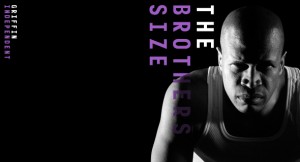The Brothers Size | Griffin Independent
- April 9th, 2011
- Posted in Uncategorized
- Write comment

She starts.
I ain’t gunna pussy-foot around.
I’m not gunna repeat what’s been said by those other folk.
You know what I’m talkin’
No?
–
You read the reviews? Waites? Simmonds? SMH? Syke?
–
No?
You seen that show?
You seen that show?
What did I think?
I’ll tell you what I think…
Resumes normal speaking/writing mode.
I’ve been catching up the last few weeks – The National Play Festival is the excuse for a lot of my theatre going attendance and responses lagging – I think a pretty good/fun excuse, actually. But now, back in the saddle.
The first in Griffin’s Independent Season for 2011 is The Brothers Size by Tarell Alvin McCraney, directed by Imara Savage, designed by David Fleisher with Marcus Johnson, Meyne Wyatt and Anthony Taufa.
The power of the play lies in it’s intensity – language punches through, powerful like a fist full of raw meat. There is a thud. Drums. Thudding drums, clicking sticks snap clacking. Three men move in formation. The light drifts up from metal grates in the floor. The men talk and sweat and sing and wrestle and challenge and confront – each other, themselves.
This is a play about accountability. Can you take responsibility for another man’s actions? What if that man is your kin? Your little brother? Can you ever be your brother’s keeper.
Oshoosi, recently out of jail slides and swerves the idea of work, shirking the offers of his older brother, Ogun, to give him a job. Oshoosi is confronted by dreams (or memories) from jail, being taken under the wing of a non-blood brother Elegba. Despite his probation, Oshoosi is soon confronted by the law – again.
It’s a slick show. And Savage has done a fine job in allowing the power and talent of Johnson, Wyatt and Taufa shine through. These are ready actors – clearly they love the meat and bone in this script – the detail, the swift left turns, the intimacy and the interrogations.
Its a compelling play. A confident production. And asks fantastic questions about familial responsibility – asking it’s audience to keep each other out of trouble. Asking us, to ponder the value of meaningful relationship/connection – what is it to be a brother? Of course I said I wasn’t going to cover what has already been said by the band of reviewers I have cited above.
I will say that I think Imara Savage is a director to watch – a challenging and culturally provocative piece of theatre, if nothing else. I also believe this to be one of the more slick, robust, confident pieces of independent theatre I’ve seen in a while – and I love being let into the secret world of men – overhearing their discussions and intimate exchanges out of earshot of women. It’s a lean show, full of force I, unlike others didn’t not object to the voulme (I didn’t find it overly shouty) I did like the force and the strength- like a muscular fist shoved in the air.
Fortunately I attended the performance which had the artist Q&A session afterwards. And from the discussion/feedback from the actors it was clear how much this play means to them – how much it touched and resonated with their personal experience.
Unfortunately, my knee-jerk reaction to this play has two responses.
1. It seems to me, the central or pivotal response from audience to this play is “great to see black people on stage” – and I despair that this, still, here and now is a novelty. After all Lee Lewis wrote in her platform paper on cross-cultural casting – we are still remarking on the colour of skin – still it is something that is “remarkable” because clearly, we haven’t addressed this glaring issue. We are not colour blind. Not even close. We are excruciatingly colour conscious. We note it. We haven’t yet evolved our art or culture to do anything but say “It’s an Afro American play with a Tongan, Aboriginal and African American in the cast! How unique!” How embarrassing we are. That this is so rare an occasion that it must be discussed – “this is so refreshing” is a sign that there is something still deeply wrong with our theatre scene.
This should be commonplace.
Not remarkable. We should only ever hear “Johnson, Wyatt and Taufa – what incredible actors” not “Johnson, Wyatt and Taufa – what incredible black actors.” As though the craft of acting was dependent on culture and skin – it’s not. I long for a day when actors of all backgrounds are present on stages, running theatre companies, attending shows. ALL. This should not be exotic – it should be everyday – and I am embarrassed that it isn’t.
2. And along the lines of that – let’s think about Chris Mead’s platform paper: “What ‘Is’ an Australian Play?: Have We Failed Our Ethnic Writers?” Where are our indigenous people’s version of this play? Where is that indigenous playwright? Why are we staging this American playwright- is it because there is no Australian equivalent? Why isn’t there? Where is the indigenous voice about this idea? Surely if these actors feel this play so passionately, and the panel of artists chatter about “universal themes” that go beyond it’s American vernacular, perhaps there is an indigenous Australian playwright out there ready to give their unique perspective on the universal themes of brotherhood?
End of Response.